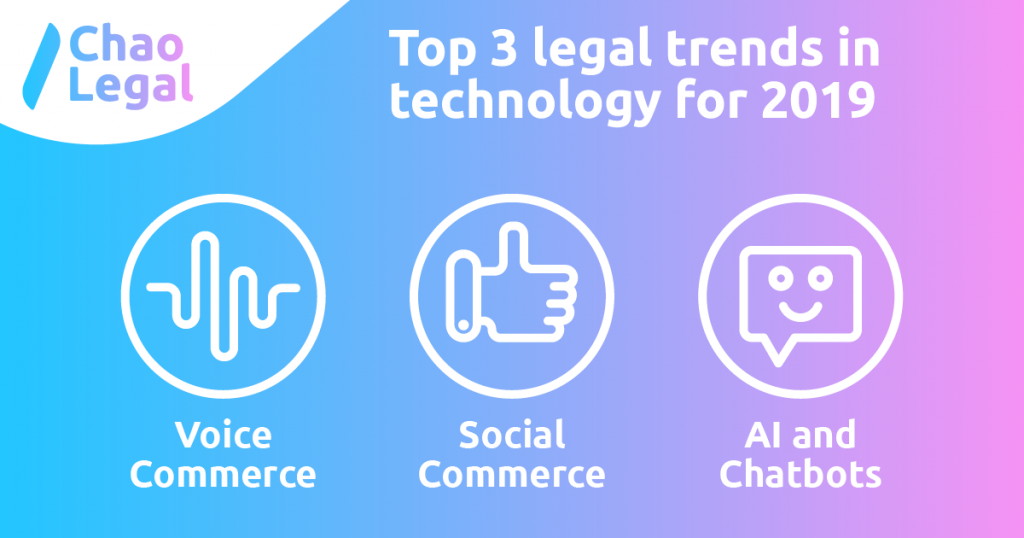New year, new technologies, new legal aspects
If you want to apply a new technology for your business, then you also need to know the legal consequences of these technologies.
In this blogpost, I share with you my personal Top 3 legal trends in technology for 2019:
- Using Voice to buy products, or ‘Voice Commerce’
- Buying products on social media, ‘Social Commerce’
- The rise of Chatbots and Artificial Intelligence
Trend #1: using Voice to buy products, or ‘Voice Commerce’
‘Voice Commerce’ is a new way to buy products with the help of Voice assistants, such as Siri (iPhone, Apple TV) and Alexa (Amazon). These smart speaker devices apply the technology of voice recognition. Voice Commerce sales is growing rapidly, and has the potential to be a multi-billion industry.
This leads to the question: What are the legal challenges if you want to use Voice in your e-commerce strategy?


- Strict e-commerce rules apply in Europe if you want to sell products remotely, which also apply to Voice Commerce. One of the main obligations of these e-commerce laws is to give all essential information to a consumer before the consumer can actually buy something. The basic e-commerce rule is the question: “Would the consumer have bought your product or service, if they had known upfront about all important information?” If you want to use Voice Commerce as an extra sales channel, I advise to take six steps that I mention in this article.
- The use of Voice devices raises privacy and security concerns. The EU privacy law General Data Protection Regulation (GDPR) requires that businesses take into account the principles of ‘Privacy by Design’ and ‘Privacy by Default’. These principles require your business to consider and embed Privacy and Security as much as possible in your products and processes.
Trend #2: buying products on social media, ‘Social Commerce’
In 2019, consumers will watch more online than television, and it will become easier to buy products directly on social media, instead of webshops (‘Social Commerce’). The distinction between an advertisement and a social media post will be less clear, and a purchase might be just one click or swipe away. But what are the legal issues if you want to use Social Commerce?
If you want to use Social Commerce to promote your business, you should take into account the mandatory advertising laws that are meant to protect consumers. The most important rule in advertising law is that an advertisement should be made clear as such, and may not be misleading about its commercial purpose.
The advertising laws require that you should provide all essential information to consumers, before they can make a purchase. There are also other legal requirements before an online purchase is final.
If you want to know more about the legal aspects of Social Commerce, go to this article.


Trend #3: the rise of Chatbots and AI technology
There is a growing use of chatbots and Artificial Intelligence (AI) in business that perform automated tasks that used to be performed by humans. AI applications need to be “fed” and “trained” with huge amounts of (personal) data, which raises privacy concerns. The question is: How does AI relate to Privacy Law?
Despite the general perception that AI algorithms are somehow “neutral” and “objective”, they can often reproduce and even enlarge existing, unknown prejudice or incompleteness in data. The main reason is that AI applications rely on the input of very large amounts of data, which data is still human-generated and inherently flawed.
When AI is used to identify people, or to make decisions about people, this requires the input of large amounts of personal data, which can be problematic from a Privacy Law point of view.
The use of AI seems to be inconsistent with several basic Privacy principles, such as data minimization and purpose limitation. A way to prevent privacy risks with AI and Chatbots is to embed Privacy as much as possible already in the design phase of your AI tool or Chatbot.
If you want to know more about how AI relates to Privacy Law, go to this article.
Curious to know more?
If you would like to know how you can deal with the legal consequences of these new technologies in your business, please contact me.






Nowadays Legal technology and software present a lot of opportunities for those in the legal profession. Firms can use technology to automate routine tasks so that lawyers can spend more time practicing law, market their law firm to build a stronger clientele base, and make their work more accessible when working remotely. Thanks for sharing this useful article.